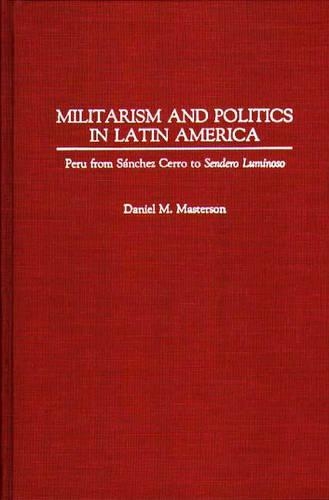
Militarism and Politics in Latin America: Peru from Sanchez Cerro to Sendero Luminoso
(Hardback)
Publishing Details
Militarism and Politics in Latin America: Peru from Sanchez Cerro to Sendero Luminoso
By (Author) Daniel Masterson
Bloomsbury Publishing PLC
Praeger Publishers Inc
26th August 1991
United States
Classifications
Tertiary Education
Non Fiction
Politics and government
History of the Americas
322.50985
Physical Properties
Hardback
360
Description
This case study of the modern Peruvian military examines the professional development of this controversial military establishment from the early 1930s to the present. Based on extensive research in Peruvian military archives and numerous interviews with active and retired members of the Peruvian armed forces, the study is placed in the context of Peruvian national politics and South American military affairs. Particular emphasis is given to the impact of France and US military theory upon the Peruvian military mentality. Revolutionary politics from the Alianza Popular Revolucionaria Americana (APRA) in the 1930s to the present day's Sendero Luminoso also figure prominently. Other topics discussed are the rationale behind General Velasco's social and economic reforms (1968-1975), the Velasco government's legacy for contemporary Peru, and the Soviet Union's heavy involvement in Peru.
Reviews
"The book gives many new insights into the evolution of the Peruvian military. Dr. Masterson has dug deeply enough to give each of the Peruvian armed forces its own personality, something rarely accomplished by others writing on the Latin American militaries."-Robert L. Scheina Author of Latin America: A Naval History, 1810-1987
.,."worthwhile reading for those interested in civil-military relations in general or intrigued by the complex legacy of the Peruian military in particular....As democracy matures and stabilizes in the region and the United States searches for new avenues of partnership with its hemispheric neighbors, it would be wise for policymakers to reflect on studies such as Masterson's to gain a proper historical perspective."-Low Intensity Conflict & Law Enforcement
...worthwhile reading for those interested in civil-military relations in general or intrigued by the complex legacy of the Peruian military in particular....As democracy matures and stabilizes in the region and the United States searches for new avenues of partnership with its hemispheric neighbors, it would be wise for policymakers to reflect on studies such as Masterson's to gain a proper historical perspective.-Low Intensity Conflict & Law Enforcement
Masterson allows Andean specialists to fill in numerous gaps in their knowledge and Latin Americanists to gain a much greater comprehension of Peru and its military.-American Political Science Review
Masterson's important study of the armed forces in 20th-century Peru analyzes the professionalization of the military leadership and its quest for a national mission. This work is similar in its treatment of civilian politician-military relations to Robert Potash's two-volume work The Army =Politics in Argentina, 1928-1945 (CH, Feb '70) and The Army =Politics in Argentina, 1945-1963 (1981). Drawn from archival investigations, interviews, and varied printed sources, Masterson's study traces the growing sense of national mission among military leaders, culminating with the reformist government that attempted to introduce sweeping socioeconomic changes to Peru from 1968 until 1980. His analysis focuses attention on the frequently conflicting national priorities of civilian and military authorities. He concludes his study with a consideration of political developments during the 1980s. Masterson offers not only reasons why the military regime of the 1970s failed to realize major reforms but suggests possible implications of this failure in meeting the Sendero Luminoso challenge during the 1990s. A detailed bibliography, photographs, and a thorough index add to the book's usefulness. Upper-division undergraduates and above.-Choice
..."worthwhile reading for those interested in civil-military relations in general or intrigued by the complex legacy of the Peruian military in particular....As democracy matures and stabilizes in the region and the United States searches for new avenues of partnership with its hemispheric neighbors, it would be wise for policymakers to reflect on studies such as Masterson's to gain a proper historical perspective."-Low Intensity Conflict & Law Enforcement
"Masterson allows Andean specialists to fill in numerous gaps in their knowledge and Latin Americanists to gain a much greater comprehension of Peru and its military."-American Political Science Review
"Masterson's important study of the armed forces in 20th-century Peru analyzes the professionalization of the military leadership and its quest for a national mission. This work is similar in its treatment of civilian politician-military relations to Robert Potash's two-volume work The Army =Politics in Argentina, 1928-1945 (CH, Feb '70) and The Army =Politics in Argentina, 1945-1963 (1981). Drawn from archival investigations, interviews, and varied printed sources, Masterson's study traces the growing sense of national mission among military leaders, culminating with the reformist government that attempted to introduce sweeping socioeconomic changes to Peru from 1968 until 1980. His analysis focuses attention on the frequently conflicting national priorities of civilian and military authorities. He concludes his study with a consideration of political developments during the 1980s. Masterson offers not only reasons why the military regime of the 1970s failed to realize major reforms but suggests possible implications of this failure in meeting the Sendero Luminoso challenge during the 1990s. A detailed bibliography, photographs, and a thorough index add to the book's usefulness. Upper-division undergraduates and above."-Choice
Author Bio
DANIEL M. MASTERSON is an Associate Professor of History at the United States Naval Academy, Annapolis, Maryland. Specializing in modern Latin American history and Latin American militarism, he has edited The Underside of Latin American History and Naval History: The Papers of the Sixth Naval History Symposium.
